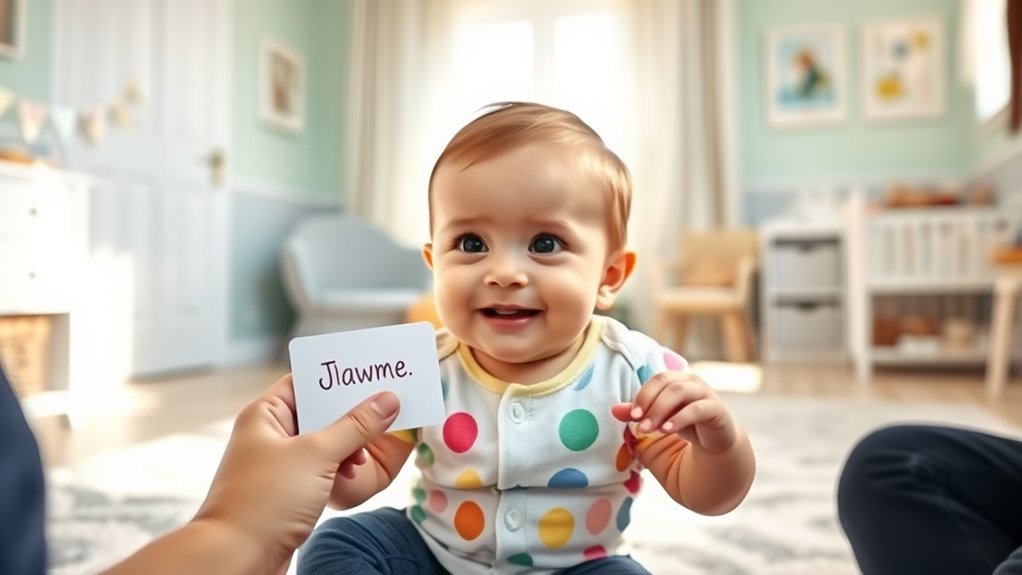To see if your baby recognizes their name, watch for signs like turning toward you, making eye contact, or smiling when you call it. Try calling their name during play or routines and notice their response. Repeating their name consistently helps them learn it. Engaging in fun activities like peek-a-boo or singing can boost recognition. Keep paying attention, and you’ll discover how close your little one is to understanding their name. If you keep exploring, you’ll find even more useful tips.
Key Takeaways
- Observe if your baby turns, makes eye contact, or smiles when you call their name.
- Use consistent, gentle calls of their name during routines to see if they respond.
- Play interactive games like peek-a-boo or sing songs that include their name to check recognition.
- Be patient and give your baby time to respond, as recognition develops gradually.
- Repeatedly and positively reinforce their name in daily interactions to strengthen their understanding.

Have you ever wondered if your baby truly recognizes their own name? It might seem like a simple milestone, but understanding how your little one responds to their name can reveal a lot about their development. Name recognition isn’t just about knowing what sounds mean—it’s a key part of social bonding, helping your baby feel connected and secure in their environment. When you call out their name, you’re not only testing their awareness but also strengthening your bond through consistent, familiar interaction. Recognizing their name signals that your baby is beginning to understand that words are linked to people and objects around them, which is an essential step in communication and social development.
Recognizing their name is a key step in your baby’s social and communication development.
To find out if your baby recognizes their name, start by calling their name gently and clearly during everyday routines. Pay attention to their response—do they turn towards you, make eye contact, or smile? These are good signs they’re starting to associate their name with themselves. Keep in mind that responses may vary depending on your baby’s age and temperament. Some babies might respond immediately, while others need more time and repeated exposure. It’s important to be patient and consistent, using their name often during play, feeding, and cuddling. When your baby responds, it reinforces their understanding that their name is meaningful, helping build their confidence and sense of security.
Engaging your baby in activities that promote social bonding can also accelerate name recognition. For example, play simple games like “peek-a-boo” or sing songs that incorporate their name. These activities make hearing their name fun and memorable, encouraging them to pay attention and respond. Making eye contact when you speak their name creates a sense of closeness, reinforcing your connection and making your baby feel valued. Additionally, research shows that repetition and consistent exposure can significantly improve your baby’s ability to recognize and respond to their name over time. Remember, social bonding through name recognition isn’t just about the response—it’s about creating a trusting relationship where your baby feels safe and loved. When they begin to recognize their name, they start to understand that you’re a consistent presence in their life, which further deepens your bond.
In essence, observing how your baby responds to their name provides insight into their cognitive and social development. It’s a gentle, everyday way to connect and support their growing awareness of the world around them. Keep practicing, stay patient, and enjoy these small but meaningful moments of recognition—they’re an important step in your baby’s journey toward communication and social connection.
Frequently Asked Questions
When Should I Start Testing My Baby’s Recognition of Their Name?
You should start testing your baby’s name recognition around 6 to 9 months, as it’s a key developmental milestone. At this stage, you’ll notice your baby beginning to respond when you call their name. Look for signs like turning their head or making eye contact. It’s a natural part of their growth, and observing these responses helps you understand their social and cognitive development better.
Can a Baby Recognize Their Name if Pronounced Differently?
You might wonder if your baby recognizes their name when pronounced differently. Babies can sometimes respond to phonetic variations, but consistent pronunciation helps reinforce recognition. If you change your tone or pronunciation, your baby may not respond as expected. To support their learning, use consistent pronunciation and avoid frequent variations. Over time, they’ll start recognizing their name regardless of slight pronunciation differences, especially if you consistently call them by the same name.
What Signs Indicate My Baby Understands Their Name?
You’ll notice signs of your baby’s understanding of their name through their responses. If they make eye contact, turn toward you, or smile when you say their name, it shows early name recognition. They may also respond with social cues like cooing or reaching out. These behaviors indicate your baby is beginning to associate their name with themselves and understands you’re addressing them, showing growing social awareness.
How Can I Encourage My Baby to Respond to Their Name?
Imagine your baby’s name as a secret code waiting to be unlocked. To encourage response, use consistent name recognition during play and routines, making your voice warm and inviting. When you speak, watch for responsive cues like eye contact or turning toward you. Reinforce this interaction with praise or gentle touches. Repetition and positive reinforcement help your baby associate their name with your attention, boosting their response naturally.
Is It Normal if My Baby Doesn’t Respond to Their Name Yet?
It’s normal if your baby doesn’t respond to their name yet, especially during early stages of baby language development. Every baby develops at their own pace, and some may take longer to recognize their name or respond consistently. Trust in your parental reassurance, knowing that this is common. Keep engaging with your baby through talking and singing, which supports language skills and helps them learn to respond over time.
Conclusion
So, next time you call your little one’s name, pay close attention. If they turn or respond, it’s a small step toward recognizing their world. With gentle patience and consistent kindness, you’re guiding them through a quiet adventure of discovery. Remember, every smile or glance is a secret handshake, a whisper of understanding. Trust the little moments—they’re the first threads weaving your child’s journey into the beautiful fabric of knowing their name.










